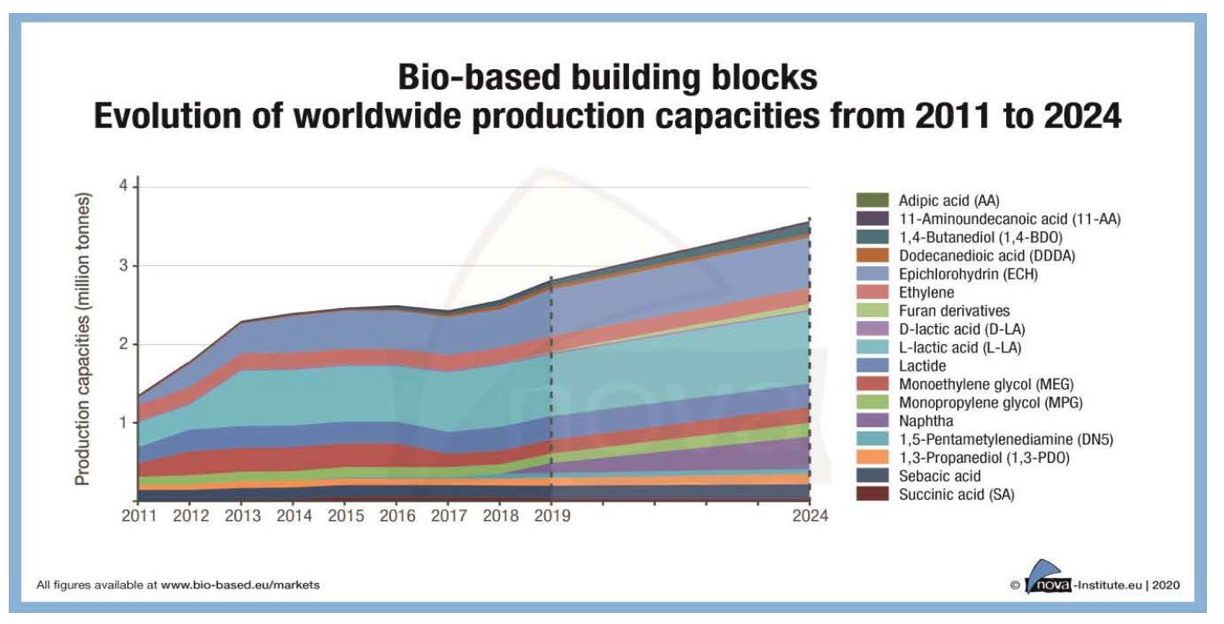The exit of key players, restructuring of production capacities worldwide, a shrinking pool of new start-up companies but also burgeoning discovery and increasing production of new building blocks
Tecnon OrbiChem and the nova-Institute release their latest “Commercialisation updates on bio-based building blocks” http://bio-based.eu/reports/
Please contact info@orbichem.com to request a Table of Contents
Since the last report in 2017 the bio-based building block market has shown considerable changes. Ranging from the exit of key players, the restructuring of several production capacities worldwide, and a shrinking pool of new start-up companies but also, burgeoning discovery and even the increasing production of new building blocks.

35 companies have undergone restructuring in this industry since 2017. Continued low crude oil prices remain one of the biggest factors hindering further commercialisation and production expansion of several drop-in bio-based commodity chemicals, especially those targeting ethylene and propylene-based derivatives. Overpromised production timelines, and hyped projected demand and capacity goals have also hurt investor confidence in this space, while some of the attention of consumer products companies as well as packaged food and beverage companies has been diverted away from using plant-based polymers and toward recycled polymer materials .
New to this report is an examination of the exciting trend toward the development of various chemical recycling technologies that can lead to alternative, more sustainable circular sources of virgin monomers such as aromatics, glycols, ethylene and propylene from waste petro-based plastics. These types of technologies can also be used for various biopolymers, even polylactic acid. Additionally, the report includes the potential comeback of bio-based acrylic acid commercialisation and the introduction of renewable naphtha, mostly driven by the growing use of the mass balance approach. Mass balance is an important system approach which supports the use of renewable or recycled content in thermochemical crackers and major integrated chemical complexes, by enabling the virtual allocation of the attributes (bio-based or recycled) and the benefits (such as circular or climate protecting) to a specific output. The report covers a number of products included in this important development such as a variety of polymer products and aromatics.
A crucial factor for the bio-based industry is the issue of climate change which continues to drive branded companies to consider using bio-based materials, which usually have lower carbon emissions in terms of feedstock use and manufacturing compared to fossil-based materials. Worldwide concerns over marine plastic pollution as well as various government bans on single-use plastic products are expected to drive increased interest in biodegradable polymers.
The rise and fall of the markets for several established bio-based building blocks as well as the commercialisation and development of novel monomers are discussed in depth in this report, including various technology processes, feedstock usage, supply/demand, trade history and pricing in order to give a full picture of the state of these markets and an analysis of their viability and long term sustainability.
The market and trend report is written by Doris de Guzman from Tecnon OrbiChem, a member of the biopolymer expert group headed by nova-Institute. The report “Commercialisation updates on bio-based building blocks” is now available for €1,750 at www.bio-based.eu/reports.
About
nova-Institute (www.bio-based.eu) is a private and independent research institute, founded in 1994; nova offers research and consultancy with a focus on bio-based and CO2-based economy in the fields of food and feedstock, technology, economy, markets, sustainability, dissemination, B2B and B2C communication and policy. Every year nova organises several leading conferences on these topics. nova-Institute has 35 employees and an annual turnover of more than €3 million.
Tecnon OrbiChem (www.orbichem.com) has been a leader in providing data and analysis to the petrochemical industry since 1976. Tecnon OrbiChem is one of the world’s foremost marketing consultancies to the bulk chemicals, petrochemicals and plastics industries, specialising in Chemical Intermediates, Synthetic Fibres and Resins. Tecnon OrbiChem publishes a monthly Bio-Materials & Intermediates newsletter covering up-to-date market information on various renewable carbon-based chemical building blocks, intermediates and bioplastics as well as their fossil-based counterparts.




